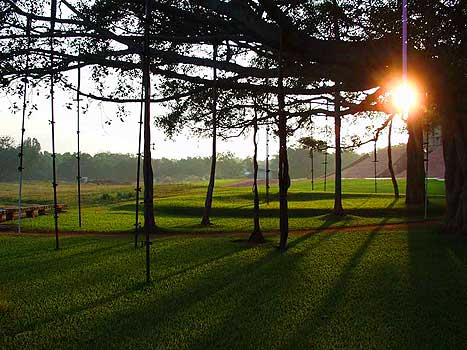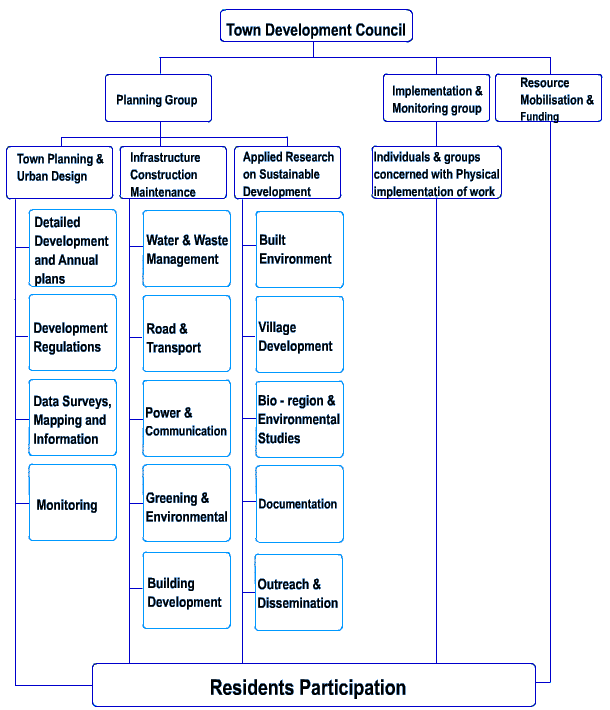| |

|
|
| |
|
|
| |
APPENDIX
1:
Members
of Governing Board and International Advisory Council of Auroville Foundation
|
|
| |
Governing
Board
1. Dr. Kireet Joshi
Chairman |
Noted Educationist, former Special Secretary (Education)
to the Government of India. |
| 2. Dr. D.P Chattopadhyaya |
Renowned scholar, former Governor of Rajasthan, former
Union Minister |
| 3. Dr. L.M.Singhvi |
Member of Parliament, noted Jurist, former High Commissioner
of India to the United Kingdom |
| 4. Dr. Subhash C. Kashyap |
Former Secretary General of Lok Sabha. |
| 5. Mr. Roger Anger |
Chief Architect of Auroville and member of Club of Budapest
|
| 6. Mr. Dibyasingh Deb |
Maharaja of Puri |
| 7. Mrs. Jyoti Madhok |
Long-time associate of Auroville |
| 8. Mr. D.P. Singh, IAS |
(Ex-officio), Director (UNESCO Unit), Ministry of Human
Resource Development |
| 9. Mr. Sanjay Narayen, IAS |
(Ex-officio), Joint Secretary & Financial Advisor to
Ministry of Human Resource Development |
International
Advisory Council
| 1. Dr. Kireet Joshi |
Chairman |
| 2. Prof. Norman Myers |
Noted Environmental Economist |
| 3. Dr. A.T. Ariyaratne |
Chairman, Sarvodaya Shramdan Movement of Sri Lanka,
noted social worker. |
| 4. Dr. Mary E. King |
Noted educationist and writer |
| Mr. N. Bala Baskar, I.A.S. |
Secretary, Auroville Foundation |
|
|
|
|
|
| |
APPENDIX 2:
Role
& Responsibilities of
Different Working Groups in Auroville
|
|
| |
Development Council
|
|
| |
A broad-based co-ordination and planning group, the Development Council
was established to ensure that the development of Auroville is in accordance
with the ideals set forth by the Mother. To facilitate this, the Group:
|
|
Defines collective priorities for development. |
|
|
Defines and select surveys required and
projects for study. · |
|
|
Implements the Master Plan approved by
the Residents Assembly. |
|
|
Monitors current and future Auroville Development
Scheme grants, and allocates unspecified funds for development. |
|
|
Develops the strategy and sets priorities
for purchase, sale and lease of land. |
|
|
Assesses and gives approval for all building
applications on Auroville land. |
|
|
| |
Economy Group |
|
| |
The Economy Group monitors Auroville's internal economy and acts as a
liaison body between the community and its commercial units. Particular
attention is given to the Central Fund and its disbursements each month.
In specific terms, the Group grants loans; keeps close contact with the
Auroville services, the Auroville Board of Commerce, the productive units
and collective budget holders; raises funds for the overall maintenance
needs of the community; and studies the AV economy to find ways of moving
it towards a true collective economy.
|
|
| |
Entry Group
|
|
| |
The Entry Group processes all applications to join Auroville, oversees
the entry procedures, and decides on the use of the Repatriation Fund.
|
|
| |
Executive Council
|
|
| |
The Executive Council deals with matters affecting the internal functioning
of the community. This mostly entails:
|
|
Policy co-ordination |
|
|
Facilitating communication by way of seminars,
meetings and referendums. |
|
|
Acting as clearinghouse for problems arising
within the community. |
|
|
| |
Funds and Assets Management Committee (FAMC) |
|
| |
The FAMC is one of the official committees of the Auroville Foundation,
specifically required to advise the Governing Board on the following:
|
|
The utilisation of the funds and management
of assets. |
|
|
Taxes and audits. |
|
|
The sale, acquisition and utilisation
of immovable assets. |
The FAMC consists of representatives of the following working groups:
ABC core group, AV Fund, AV Maintenance Fund, CSR, Development Group,
Economy Group, Entry Group, Executive Committee, Farms & Forest Groups,
Financial Service, Housing Service, Land and Estate Management, Matrimandir,
SAIIER administration and the Working Committee. As members of the Governing
Board residing in Auroville, the Secretary and the Finance Officer are
also members.
|
|
| |
Land and Estate Management (LEM)
|
|
| |
Auroville's land management office, is located at Bharat Nivas. LEM is
the centralised facility where maps and records can be consulted, land
purchases and allocation discussed etc. Essentially, LEM has 3 main functions:
|
|
Management of all Auroville lands and fields
not looked after by or forming part of an AV community. |
|
|
Land surveys (where the boundary between
AV and private land is not clear), administration, maintenance of
records, payment of land taxes, liaison with local authorities on
land matters, and court cases where land ownership is disputed. |
|
|
Negotiation and registration of new land
purchases. |
|
|
| |
Project Co-ordination Group |
|
| |
Co-ordinates all grant proposals for AV Projects to ensure maximum effectiveness
and non-duplication of approach to potential donors. In support of this,
a project consultancy-cum-writing service called "Abundance" is provided.
The Group is Auroville's officially recognised channel to Auroville International
Centres, the Foundation for World Education and Stichting de Zaaier on
all fund raising matters, and is the only body authorised to endorse proposals
for fund raising outside Auroville.
|
|
| |
Working Committee
|
|
| |
An official Auroville working group specifically responsible, under the
Auroville Foundation Act, for assisting the Residents Assembly and liaisoning
with the Governing Board of the Auroville Foundation and the outside.
The Committee deals with many of the major issues that arise affecting
Auroville vis-a-vis the outside world, while Auroville internal matters
are mostly looked after by the Executive Council. Members usually hold
office for a period of 2 years, but many serve longer.
|
|
| |
Auroville Village Action Group
|
|
| |
AVAG works in 35 local villages, directly benefitting 2,000 people and
indirectly 30,000+ through its team of 20 development workers. The main
aim of AVAG is to make the local people aware of their social, cultural
and environmental conditions while bringing general benefit to them. Areas
of specific action, involvement and / or achievement include:
|
|
| |
|
|
Supporting Isaiambalam Research School, Kindergarten and Crèche;
a Life Education Centre in Kottakarai offering education and vocational
training for young school-drop-out girls; and Night Schools in 23
villages plus crèches in schools by introducing innovative and participatory
educational methods.
|
|
|
Supporting 29 women's groups that meet regularly, initiate and
implement community projects, operate savings clubs, and support
each other in crisis.
|
|
|
Promoting environmental awareness, health awareness and community
hygiene in collaboration with the Auroville Health Centre and other
Auroville groups.
|
|
|
Giving small grants for community service initiatives on a cost-sharing
basis with village groups.
|
|
|
| |
Farm Group |
|
| |
The Farm Group meets regularly to coordinate Auroville's farming activities
and share information with a view to increasing Auroville's self-sufficiency
in food production. Along with the Forest Group (see separate note) the
Group is represented on the Green Group, and also sends representatives
to other policy-making meetings in Auroville.
|
|
| |
Financial Service/Auroville Maintenance Fund
|
|
| |
The maintenance Fund, which incorporates the Central Fund (see separate
Note), is Auroville's major fund concerned with internally generated and
circulating money, as opposed to contributions from outside, which are
handled by Auroville Fund.
The administrative aim is to collect monthly maintenance contributions
for Aurovilians from Auroville units, individual contributions and guest
contributions, and handle the distribution, mainly through the Central
Fund. The Fund is computerized and linked with Pour Tous, so can arrange
payment for gas bottles, food, purchases from commercial unit, and water
service, electricity, telephone, milk and bakery bills.
The Financial Service/AMS can also exchange foreign currency, travellers
cheques and personal cheques.
|
|
| |
Forest Group
|
|
| |
A group actively involved in the planting and maintenance of Auroville's
forested areas, particularly the protective Green Belt around the township.
|
|
| |
Green Group |
|
| |
The Green Group, consisting of representatives from the Farm Group and
Forest Group, reviews issues pertaining to the development of the Green
Belt, and advises on them according to environment protection principles
while trying to facilitate the overall growth of Auroville. Though the
primary concern at present is watershed management and reforestation,
integrated farming practices are also a priority. The Group interacts
with the Development Council as required.
|
|
|
|
|
| |
APPENDIX
3:
Auroville
Foundation - Consolidated Income & Expenditure For the Year Ended
31.09.1999
|
|
Research / Service Units
| 1997- 98 |
Expenditure |
1989- 99 |
1997- 98 |
Income |
1998- 99
|
|
114,449.74
|
To Auromitra |
139,083.54
|
491,518.84
|
By Auroville services |
____
|
|
7,008,796.83
|
Auroville Fund |
|
|
Auroville Fund |
14,247,273.88
|
|
8,326,438.68
|
Center for Scientific Research |
3,012,002.47
|
|
|
|
|
722,742.29
|
Sri Aurobindo International Institute
of Educational Research |
704,639.99
|
15,837,902.55
|
By Excess of Expenditure over Income |
____
|
|
156,993.85
|
Sri Aurobindo International Institute
of Educational Research (GOI) |
263,405.30
|
|
|
|
| |
Excess of Income over Expenditure |
10,128,142.58
|
|
|
|
|
16,329,421.39
|
|
14,247,273.88
|
16,329,421.39
|
|
13,247,273.88
|
Commercial Units
| 1997- 98 |
Expenditure |
1989 - 99
|
1997- 98
|
Income |
1998 - 99
|
|
_____
|
To Auroville Export Trust |
3,307.21
|
172,340.95
|
To Auroville Export Trust |
____
|
|
_____
|
To Aurore Trust |
100,098.41
|
13,940,742.39
|
Aravinda Trust |
19,340,663.88
|
|
3,877,818.38
|
Aurosarjan Trust |
2,730,344.12
|
226,282.43
|
Altecs Trust |
437,397.51
|
|
_____
|
Auroservice
d' AV 1993 Trust |
649,362.47
|
1,170,276.01
|
Ankur Trust |
393,730.55
|
|
1,701,810.87
|
To ABC Trust |
937,638.37
|
2,445,777.07
|
Artisana Trust |
3,764,016.58
|
|
2,160,014.70
|
ADPS Trust |
3,387,498.47
|
2,078,667.79
|
Auromics Trust |
495,003.85
|
|
25,486.08
|
Center for Scientific Research |
_____
|
2,065,415.50
|
Auromode Trust |
660,002.61
|
|
570,617.77
|
Filaure Trust |
_____
|
161,120.92
|
Auroservice
d' AV 1993 Trust |
_____
|
|
31,405.51
|
New Engineering Trust |
196,269.76
|
_____
|
Filaure Trust |
421,122.35
|
| |
|
|
135,316.15
|
Kalki Trust |
282,054.57
|
|
14,317,943.99
|
To Net Profit |
18,184,745.03
|
289,158.09
|
Toujours Mieux Trust |
392,271.94
|
|
22,685,097.30
|
|
26,186,263.84
|
22,685,097.30
|
|
26,186,263.84
|
|
|
|
|
|
|
| |
APPENDIX
4:
Securing
Land for Orderly & Planned Development
|
|
| |
The designated Auroville Township area covers 19.63 sq. km, i.e. 1963
ha. as on 1st August 2000 Auroville has under its ownership 778 ha. of
land in the designated township area, while about 980 ha. still have to
be secured for Auroville's proper and complete development into a township
for 50,000 people. All the lands so far have been acquired by negotiated
purchase from land owners.
All over India, the acquisition of land for development purposes by compulsory
acquisition under the Land Acquisition Act has become more and more difficult.
Acquiring land by negotiation is also becoming increasingly difficult
and expensive because of speculative tendencies, particularly by real
estate developers. In the case of Auroville, the situation is much more
critical. The development of Auroville has transformed a barren inhabitable
plain into a verdant area. This has attracted speculative developers from
the neighbouring urban areas.
One of the principal objectives of the Auroville Master Plan (Perspective:
2025) is to ensure that planned developments are not overtaken by haphazard
and deleterious development by speculators for personal gain. It will
be observed from zoning regulations that farming and research for increasing
productivity in the agricultural and farm sectors (especially to apply
to other parts of the State) will be one of the main uses of lands that
surround the inner part of the Auroville Township. In the context of the
above situation, it is proposed to employ different options for securing
the land for the development of Auroville as planned.
|
|
| |
1. Land
Exchange |
|
| |
Auroville has presently under its ownership extents of land outside the
20 square kilometres area. Some of these lands could be offered in exchange
for unutilised lands that are needed to establish research and field stations
for agricultural and farm development in the Green Belt.
|
|
| |
2. Land
for employment |
|
| |
There are several pockets of land owned by villagers, which are not of
a viable size for supporting economic production. Further, a large number
of persons have a right on the land, which makes it difficult to put it
to useful purposes. In such cases, Auroville could offer employment in
farming, forestry and other Auroville activities, including vocational
training, in return for the land that will be offered at a negotiable
price.
|
|
| |
3. Leasing
of land |
|
| |
As an alternative to (2), Auroville proposes to make lease agreements
with landowners. These agreements would stipulate that Auroville has the
first option of purchase against payment of a yearly amount to the landowner.
The agreement would also stipulate restrictions on land use and prevent
sale to third parties.
|
|
| |
4. Land
pooling and sharing for joint development |
|
| |
Auroville proposes this approach as a method that will benefit both the
landowner and Auroville. Auroville will use its resources and expertise
to generate crops and other produce on the land, which will generate much
higher returns after setting apart amounts for the inputs of Auroville
resources. The villager will continue to own and work on the land.
|
|
| |
5. Purchase
of land |
|
| |
Auroville's policy has always been to secure the land by voluntary sale
via negotiation with the landowners, with no compulsion or coercion, keeping
in mind their needs and long term welfare. This method will continue to
be pursued for lands to be acquired for Auroville's development.
|
|
| |
6. Acquisition
under the Land Acquisition Act |
|
| |
The Auroville Foundation is a statutory body, created by an Act of Parliament
to further the development of Auroville in accordance with its original
Charter, given by The Mother. Therefore, any acquisition of land towards
the development of Auroville would come under the definition of public
purpose under the Land Acquisition Act.
There are certain important developments, such as road widening and construction
of utility structures, which cannot be normally secured by the options
mentioned above. Auroville proposes to approach the Tamil Nadu State Government
in order to obtain such lands through the Land Acquisition Act. Another
instance is where real estate developers propose to dispossess the landowner
of his land for his own monetary benefits. In such cases also, Auroville
will propose acquisition of these lands, unless one of the above mentioned
options can be used.
|
|
| |
7.
Zoning Regulations |
|
| |
Most of the options listed above will take time and effort. There are
bound to be instances where a single unplanned development may jeopardise
not only future developments, but even those that have been carried out
earlier. Hence, it becomes imperative that all the lands that are required
for the development of Auroville are covered in such a way that no person
would contravene the zoning regulations made in the Master Plan. For this
purpose, necessary mechanisms have to be approved by the Government of
India along with the State Government. Such mechanisms would provide a
most important and decisive tool for safeguarding the lands needed for
Auroville's development from speculative, damaging and environmentally
unsound development.
|
|
| |
8. Conclusion
|
|
| |
It is envisaged to secure an annual average of 100 hectares per year over
the next 10 years by employing these various mechanisms.
|
|
|
|
|
| |
APPENDIX
5:
Organisational
Structure for Master Plan
|
|
 |
|












